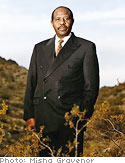Oprah's Cut with Paul Rusesabagina

His country had gone totally, blood-in-the-streets mad. Neighbors attacking each other with machetes. A million slaughtered. Twelve years later, Oprah talks one-on-one with the real-life hero of the 2004 film Hotel Rwanda.
Oprah: In your book [An Ordinary Life], you write that you walked out of your house the first morning of the killings and saw your neighbors armed with machetes.
Paul: That was a terrible day. Men I'd known for years were carrying machetes, grenades, guns, spears—any weapon you can think of. Neighbors I'd seen as gentlemen had suddenly become killers in military uniforms.
Oprah: How do the people you've shared barbecues with become the personification of evil?
Paul: I've never understood. Some of our neighbors were murdered that morning. My son found a mother, her six daughters, and her son slaughtered. Some of them weren't completely dead yet. They were still moving slightly. After my son came running home, he didn't talk for four days. We couldn't understand how our country could just go mad.
Oprah: Would the violence have erupted if that plane hadn't been shot down? [On April 6, 1994, a plane carrying Hutu president Juvénal Habyarimana was shot down, killing him along with the president of neighboring Burundi. Although no one could prove who ordered the attack, retaliation was immediate: Opposition leaders were murdered, and suddenly civilians were slaughtering every Tutsi and moderate Hutu they could find.]
Paul: That added oil to a burning fire. Since the sixties, Hutus and Tutsis have been in heavy tension.
Oprah: Here's why I found your book so fascinating: It shows what role radio played in inciting the masses.
Paul: In 1993 a station called the "radio-television of the thousands of hills" was started. It was funded by Rwanda's then president, Habyarimana, and his akazu—his closest friends, including leaders and businessmen. When the president was threatened by armed rebels, he decided to fight and keep power by all means.
Oprah: So media was his tool.
Paul: To do evil.
Oprah: It's interesting how quickly propaganda can change the commonsense thinking of everyday people.
Paul: In Rwanda people don't buy newspapers or magazines. They prefer radio. Every peasant on the plantation, everyone on buses, in cars, listens. It was a planned strategic manipulation to use radio for evil. [Once the violence started] people were hiding in the bushes. On the radio, leaders encouraged people to clear the bushes and kill their neighbors.
Print correction: You can find Paul's memoir An Ordinary Man at www.apbbookstore.com.
Oprah: In your book [An Ordinary Life], you write that you walked out of your house the first morning of the killings and saw your neighbors armed with machetes.
Paul: That was a terrible day. Men I'd known for years were carrying machetes, grenades, guns, spears—any weapon you can think of. Neighbors I'd seen as gentlemen had suddenly become killers in military uniforms.
Oprah: How do the people you've shared barbecues with become the personification of evil?
Paul: I've never understood. Some of our neighbors were murdered that morning. My son found a mother, her six daughters, and her son slaughtered. Some of them weren't completely dead yet. They were still moving slightly. After my son came running home, he didn't talk for four days. We couldn't understand how our country could just go mad.
Oprah: Would the violence have erupted if that plane hadn't been shot down? [On April 6, 1994, a plane carrying Hutu president Juvénal Habyarimana was shot down, killing him along with the president of neighboring Burundi. Although no one could prove who ordered the attack, retaliation was immediate: Opposition leaders were murdered, and suddenly civilians were slaughtering every Tutsi and moderate Hutu they could find.]
Paul: That added oil to a burning fire. Since the sixties, Hutus and Tutsis have been in heavy tension.
Oprah: Here's why I found your book so fascinating: It shows what role radio played in inciting the masses.
Paul: In 1993 a station called the "radio-television of the thousands of hills" was started. It was funded by Rwanda's then president, Habyarimana, and his akazu—his closest friends, including leaders and businessmen. When the president was threatened by armed rebels, he decided to fight and keep power by all means.
Oprah: So media was his tool.
Paul: To do evil.
Oprah: It's interesting how quickly propaganda can change the commonsense thinking of everyday people.
Paul: In Rwanda people don't buy newspapers or magazines. They prefer radio. Every peasant on the plantation, everyone on buses, in cars, listens. It was a planned strategic manipulation to use radio for evil. [Once the violence started] people were hiding in the bushes. On the radio, leaders encouraged people to clear the bushes and kill their neighbors.
Print correction: You can find Paul's memoir An Ordinary Man at www.apbbookstore.com.



